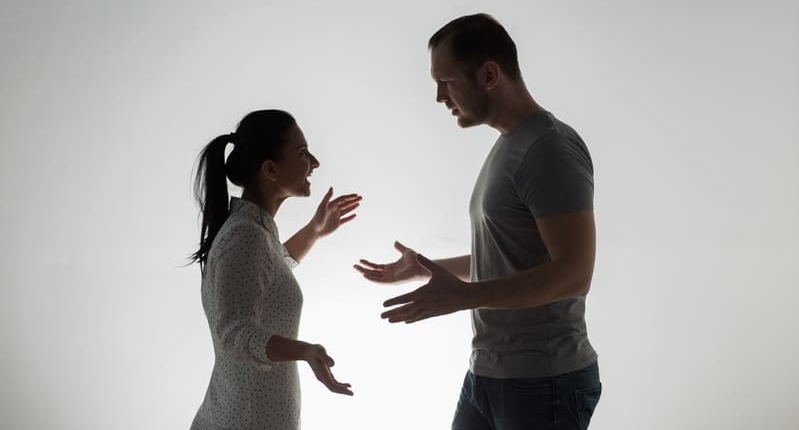No matter how careful you are, you will inevitably run into conflict in your relationship. It is impossible to try to merge two lives without regularly encountering deep sources of incompatibility. Even in a good relationship, couples have ugly screaming matches, say mean things to each other, get critical and defensive, or engage in stonewalling. It has been said that on average a couple will have between thirty and fifty significant arguments a year that fall outside of the bounds of civilized dialogue.
As we have little public evidence of what is going on behind many closed doors, we tend to think we are the only ones who encounter difficulties in our partnerships. We are then left with a collective shame around the reality of what goes on inside our homes. We may think we are the exception with no hope of redemption. This idea combined with a lack of education and skills in the art of love can have us feel enormous loneliness around our relationship difficulties.
As we feel our pain and suffering increase, we often reflexively blame our partner and may begin to question whether we are really with the right person. “If only they paid attention… listened… turned me on more,” and we can become increasingly unhappier.
All conflict is really a misunderstanding—one of the people in the fight does not feel loved, respected, or seen. Dr. Howard Markman noted Relationship expert has said, there are three main reasons for most relationship impasses: power and control; care and closeness; and respect and recognition.
These misunderstandings are often largely rooted in our past rather than being about our partner. According to marriage expert Harville Hendrix, “up to 90 percent of the frustration your partner has with you is really about their issues from childhood, meaning that only 10 percent or so is about each of you right now.”
We’re actually looking at them essentially through trauma colored glasses that transport us to the past where we re-experience childhood trauma instead of really seeing the partner there in front of us. Many of us have no idea that the past is intruding into the present moment.

Photo by Andriyko Podilnyk on Unsplash
The truth is our partners are uniquely designed to reactivate our unhealed places and unfinished conversations.
This news should give you hope if you have been experiencing pain around the conflict with your partner. It tells us that we don’t have to fight or flee from our partner out of fear of incompatibility. Rather we can recognize that our partner is touching sensitive nerves based on past experiences, and it’s not that we are with the wrong partner; we just have the wrong set of glasses!
By seeing our partner with new eyes we can gather the courage to begin to heal from those early wounds instead of seeing the worst in our partner. Doing this kind of healing work allows us to return to love and is a built-in opportunity to continue our growth through the uniquely designed teacher that is our partner. Conflicts then can be our greatest teachers and source of evolution and healing should we decide to take up the cause.
Having the skills to better relate to our partner in moments of conflict can also help cultivate more love in our relationships. It turns out that love is in fact not just enthusiasm but a skill. The good news is that these are skills we can learn!
In fact, much of the art of love involves knowing how to respond to a dissatisfied partner, something most of us have never been taught. This is a critical skill to have as it can help you to de-escalate a fight and keep it from getting out of control.
Here are a few tips to handling upset in your relationship.
MAKE IT A RULE TO HAVE ONLY ONE PERSON TRIGGERED AT A TIME
This is easier said than done but if you notice that either one of you is getting triggered, ideally the other person should be on alert and move into a protective position for the relationship itself so that wounding is minimized.
If both of you get triggered this is usually when the real knife wounds can happen and the relationship can be damaged. Make it a rule that only one of you gets triggered at a time—let your partner have their moment instead of trying to stop their upset. This will prevent it from escalating into a conflict and that downward spiral of attack, blame, defend cycle we all know so well.
There is an epidemic of reaction going on between couples and many move too easily into full-blown conflict, which is a lot harder to repair. We often use the fact that we are having emotions as the basis to treat our partners badly. Instead, try these approaches.
CALM YOUR OWN NERVOUS SYSTEM
When your partner is triggered try to calm your own nervous system. This is the highest act of love you can do with someone you care about. Calming your own nervous system can help calm the situation down and prevent things from escalating.
Chances are that your own amygdala will be getting activated, and you will need to be proactive in keeping yourself calm. Unfortunately, you won’t be able to think yourself calm. The easiest route is to calm yourself is by activating your breath. You can do this by inhaling and then exhaling twice as long as your inhale. This kind of self-regulation through your breath is critical.
We live in a culture that is very right/wrong, good/bad/blame, and we tend to jump to this kind of position. The real work of a relationship is downregulating your own defensiveness so you are better able to hear and receive your partner. Breathing will help you do this.
WITNESS YOUR PARTNERS UPSET
Once you have been able to calm yourself, let your partner have their feelings without it being about you. Give them the space to be pissed. Let them have the meaning they are making of things. Don’t convince them not to be upset or justify yourself. Try putting up your invisible shield and let their words hit the shield instead of taking offense to everything they say. This is about having a strong boundary and only letting in what is true. Again easier said than done but something we should all be striving for.
VALIDATE & EMPATHIZE YOUR PARTNERS FEELINGS
If you maintain your calm resourced space, you are then in a better place to validate and empathize with your partner’s feelings. These feelings they are expressing may not be true for you, but they are always right for them. Very often the person closest to you will have a completely different experience than you have of the same event.
Try not to judge what they are expressing, but rather honor the fact that they are having this feeling. Your partner wants to be validated for their feelings—they are true for them. Have your energy be I am here. I am not going anywhere. I am listening. Take a deep breath and acknowledge their upset. Say things like “I can totally understand why you are upset.” Or “I totally know how much you hate this.” “What you are going through matters to me.”
Talk about what you feel as opposed to what the person did or did not do. Convey empathy and give them the reassurance they need that you are there for them and are not going anywhere.
Validation has power and is the opposite of the toxic patterns of blame and defensiveness which are often found in unhealthy relationships.
YOU WANT TO MOVE YOURSELF FROM REACTING TO RESPONDING
In order to level-up your relationship skills, there needs to be a shift from reacting to responding—from escalating the situation and/or staying in your stubbornness to listening and being reflective with your partner. When you do this sincerely, it can end arguments and completely transform things between you and your partner.
Making this kind of choice can have you move through things much more quickly as well; otherwise, you may be stuck in hours of heated debate. We need to shift our relationship to conflict from something detrimental and potentially catastrophic to a means of deepening your understanding of yourself and your partner. Julie Gottman noted marriage therapist has said that “Conflict is an opportunity to learn to love our partner better over time.” Which will you choose?
Getting into rapport with your partner’s emotions in this way will help de-escalate conflict in your relationship and minimize any damage that may have normally occurred. From there you can deal with the issue itself. Witnessing your partner in their upset can actually help deregulate a fight by 50 percent according to love expert Annie Lalla.
GET CURIOUS ABOUT WHAT YOUR PARTNER IS SAYING
Getting curious about your partner’s upset can help bring it down another 50 percent. Coming from a place of curiosity can give your partner’s upset dignity and can create real intimacy in the moment. Getting to a place of shared reality will give you a chance to make progress with the issue and say things like, “Are you trying to say this?” And then repeat it back to them. “Is this what it is?” “Why do you think that way?” “Why do you believe this?’
Ideally, you are able to peel back several onion layers of your partner’s upset so you can begin to transcend the misunderstanding between you. The more questions you ask, the more you will understand your partner rather than making up stories about them.
Approaching your relationship issues like this can be a game-changer. Self-regulating, staying curious and engaged instead of walking away thinking “This relationship is ruined” can help transform the connection between you and your partner. Taking these steps preserves the dignity of your partner and yourself and honors the relationship as well.

